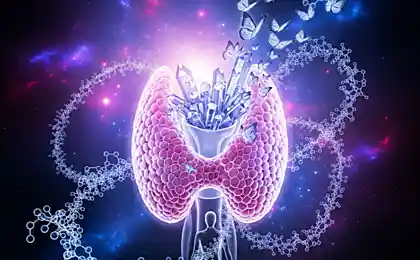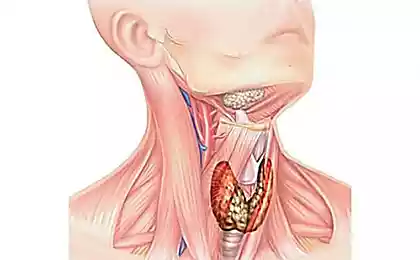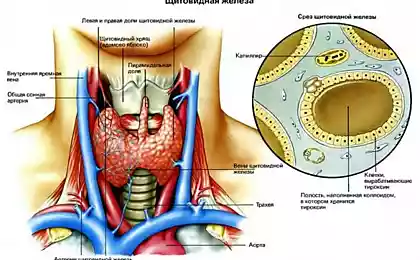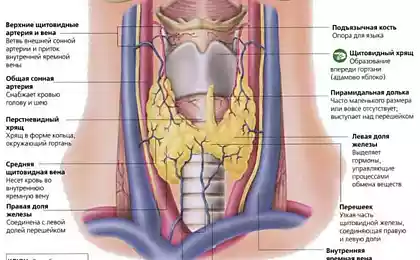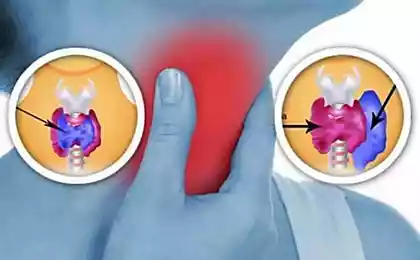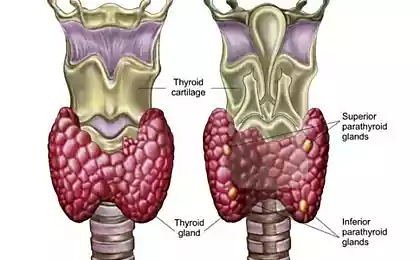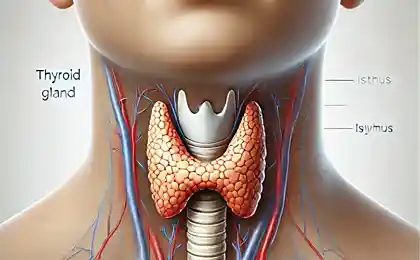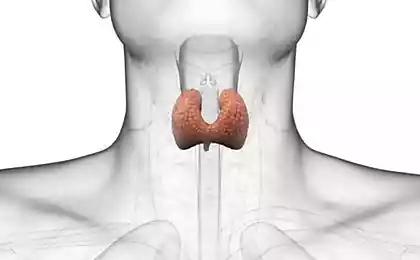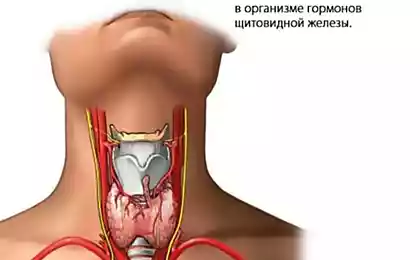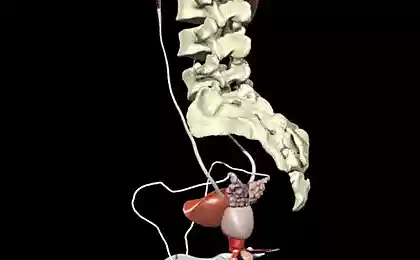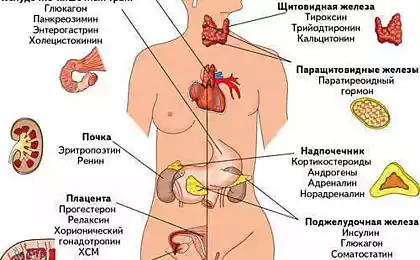252
The main topics of psychosomatics of thyroid diseases
The psychosomatics of the thyroid gland are several topics:
1. The subject of defense.
The name of the thyroid gland comes from the word "shield". The iron seems to protect the larynx, acting as a shield.
If there are stories of hanging, stabbing in the throat, etc. in the family tree, and there are fears associated with this event, then thyroid tissues can respond to these fears with growth, increasing protection.
2. The main theme of thyroid psychosomatics is time and speed.
The thyroid gland produces hormones that regulate metabolism. What does that mean? The amount of hormones in it determines how fast the processes in the body will proceed. Quick or slow.
It is logical that the body chooses the thyroid gland to help when a person has suffering associated with the topic of time and speed.
3. The subject of injustice.
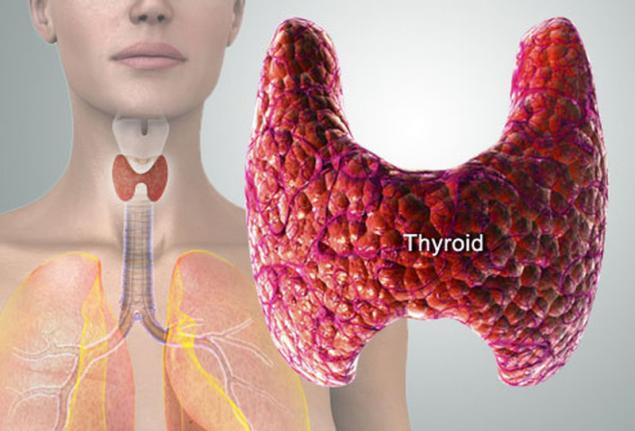
Psychosomatics of hyperthyroidism
1) You need to do everything quickly, quickly, and you do not have time. What's left to the body? Increase the parenchyma of the thyroid gland, so that more hormones responsible for metabolism in the body are produced.
2) Accident.
The woman developed hyperthyroidism after the death of her mother. It turned out that she still can not accept what happened. It seems to her that if they had managed to carry out all the necessary medical procedures, then the mother would be alive. Despite the fact that it is over, a part of the woman is still in a hurry to get everything done. The body helps through hyperthyroidism.
(3) The feeling of being in constant danger.
The thyroid gland (along with the adrenal glands) is a gland that responds to constant danger because its hormones increase metabolic rate – which helps speed up and cope with danger.
(4) A person sets a goal - a desired "piece". A new job, a wedding with a young man, buying a passionately desired thing. You have to hurry up, work hard to get it. The thyroid gland can react.
(5) If a child is diagnosed with hyperthyroidism, you need to check whether everything is in a hurry to have time for his parents, And also whether the parents of the child contribute to his constant haste.
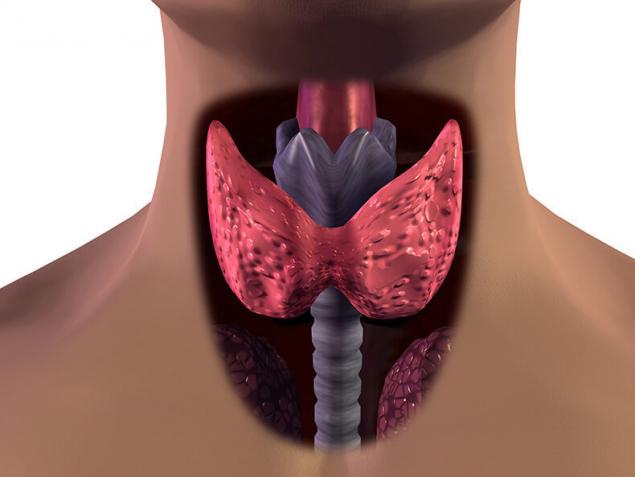
Psychosomatics of hypothyroidism
1) A person suffering from hypothyroidism once unknowingly decided to slow down.
He may have been in constant activity for too long. And this activity is still suffering for him.
Perhaps the decline in activity is a solution against the mother's constant pokes, who still sit in it: "Come quick." You have to be the best. Why are you doing everything wrong? The person internally resists this. Activity, speed is forbidden for him, because if he starts to move quickly, it means his mother loses.
2) The desire to slow down the departure of another person.
If someone is seriously ill, the best way to stay longer with a loved one is to slow down time. And even after the death of a loved one, as we have already understood, the desire to slow down time can remain if a person has not coped with grief himself, has not built the care of a loved one in his picture of the world.
(3) If the stress lasts too longA person may become tired and unconsciously give the command to stop so as not to feel anything. The body will help hypothyroidism.
(4) If hypothyroidism in children, then, as usual, we begin with the experiences of the parents, if the child is small..
Osteochondrosis - payback for not understanding your own bodyWhy is green not used anywhere in the world, except for the CIS?
Also, do not forget that if the child is too nimble, and the parents show severe dissatisfaction with his behavior, then the child may unconsciously decide that it is better to be calm and quiet, so that the parents accept. The result is hypothyroidism.
I can say that our body reacts very quickly with the help of hormones to all changes in mental well-being. Also in the case of thyroid psychosomatics. All hormonal disorders return to normal if you change your negative states once and for all. published
Author: Elena Guskova
Source: elenaguskova.ru/psihosomatika-shhitovidnaya-zheleza/
1. The subject of defense.
The name of the thyroid gland comes from the word "shield". The iron seems to protect the larynx, acting as a shield.
If there are stories of hanging, stabbing in the throat, etc. in the family tree, and there are fears associated with this event, then thyroid tissues can respond to these fears with growth, increasing protection.
2. The main theme of thyroid psychosomatics is time and speed.
The thyroid gland produces hormones that regulate metabolism. What does that mean? The amount of hormones in it determines how fast the processes in the body will proceed. Quick or slow.
It is logical that the body chooses the thyroid gland to help when a person has suffering associated with the topic of time and speed.
3. The subject of injustice.

Psychosomatics of hyperthyroidism
1) You need to do everything quickly, quickly, and you do not have time. What's left to the body? Increase the parenchyma of the thyroid gland, so that more hormones responsible for metabolism in the body are produced.
2) Accident.
The woman developed hyperthyroidism after the death of her mother. It turned out that she still can not accept what happened. It seems to her that if they had managed to carry out all the necessary medical procedures, then the mother would be alive. Despite the fact that it is over, a part of the woman is still in a hurry to get everything done. The body helps through hyperthyroidism.
(3) The feeling of being in constant danger.
The thyroid gland (along with the adrenal glands) is a gland that responds to constant danger because its hormones increase metabolic rate – which helps speed up and cope with danger.
(4) A person sets a goal - a desired "piece". A new job, a wedding with a young man, buying a passionately desired thing. You have to hurry up, work hard to get it. The thyroid gland can react.
(5) If a child is diagnosed with hyperthyroidism, you need to check whether everything is in a hurry to have time for his parents, And also whether the parents of the child contribute to his constant haste.

Psychosomatics of hypothyroidism
1) A person suffering from hypothyroidism once unknowingly decided to slow down.
He may have been in constant activity for too long. And this activity is still suffering for him.
Perhaps the decline in activity is a solution against the mother's constant pokes, who still sit in it: "Come quick." You have to be the best. Why are you doing everything wrong? The person internally resists this. Activity, speed is forbidden for him, because if he starts to move quickly, it means his mother loses.
2) The desire to slow down the departure of another person.
If someone is seriously ill, the best way to stay longer with a loved one is to slow down time. And even after the death of a loved one, as we have already understood, the desire to slow down time can remain if a person has not coped with grief himself, has not built the care of a loved one in his picture of the world.
(3) If the stress lasts too longA person may become tired and unconsciously give the command to stop so as not to feel anything. The body will help hypothyroidism.
(4) If hypothyroidism in children, then, as usual, we begin with the experiences of the parents, if the child is small..
Osteochondrosis - payback for not understanding your own bodyWhy is green not used anywhere in the world, except for the CIS?
Also, do not forget that if the child is too nimble, and the parents show severe dissatisfaction with his behavior, then the child may unconsciously decide that it is better to be calm and quiet, so that the parents accept. The result is hypothyroidism.
I can say that our body reacts very quickly with the help of hormones to all changes in mental well-being. Also in the case of thyroid psychosomatics. All hormonal disorders return to normal if you change your negative states once and for all. published
Author: Elena Guskova
Source: elenaguskova.ru/psihosomatika-shhitovidnaya-zheleza/
Why you should NEVER post photos of their children on the Internet
Teach children to dream and not to be afraid of...
